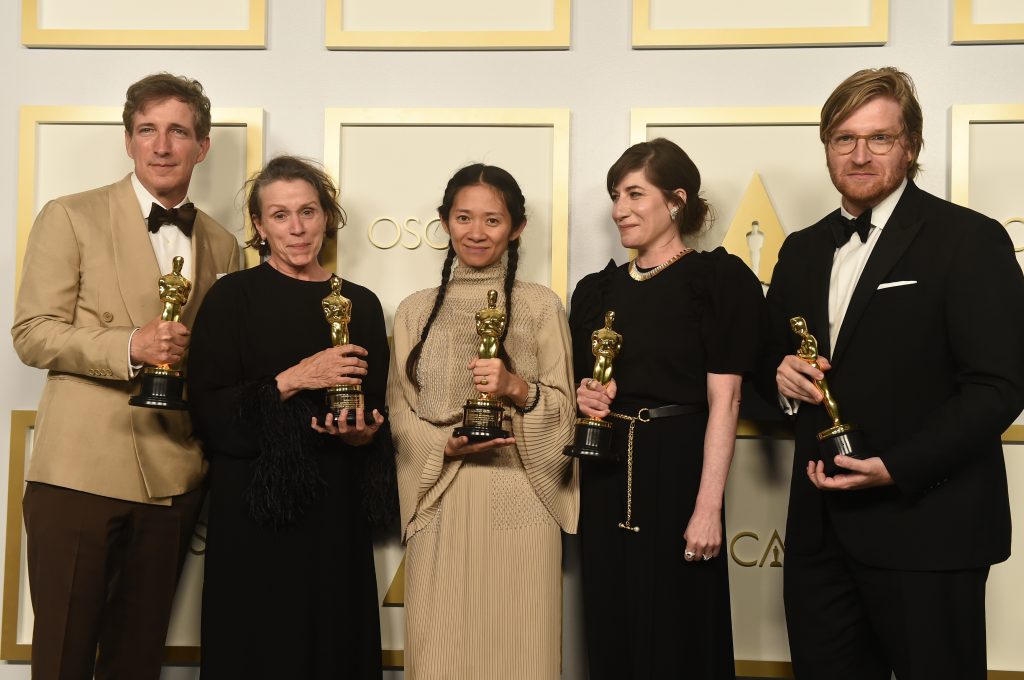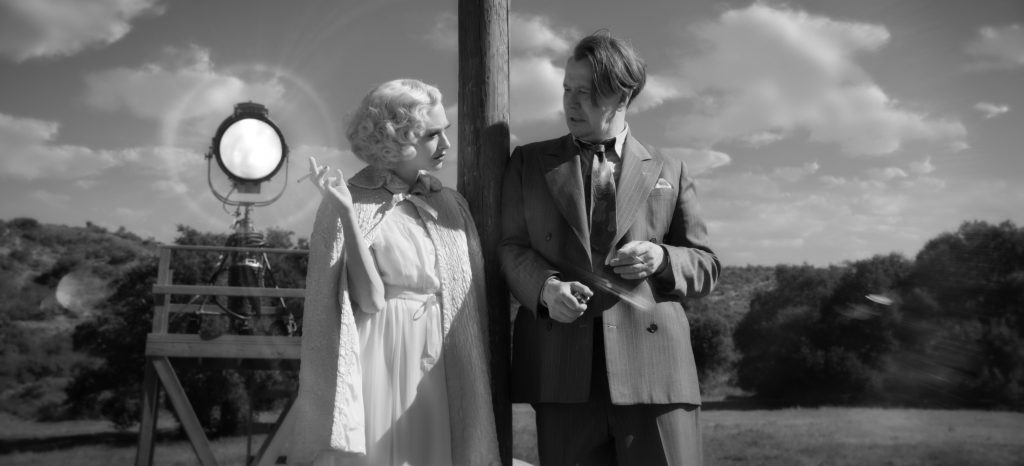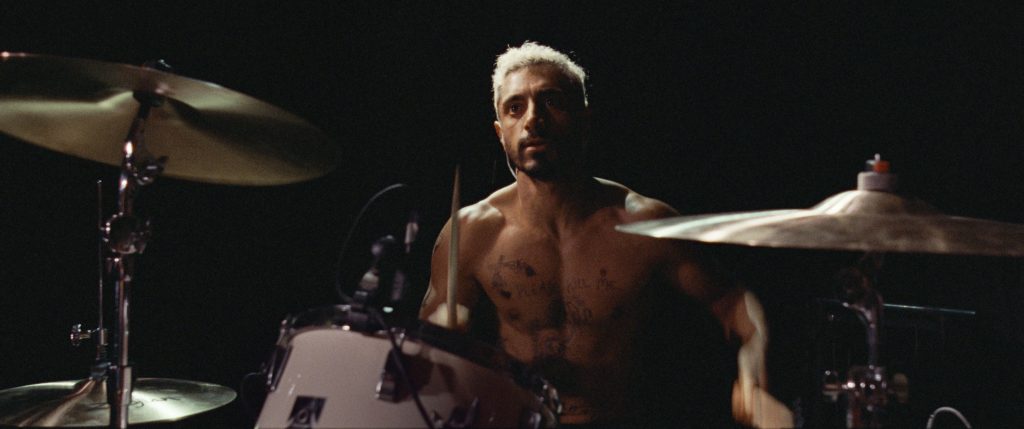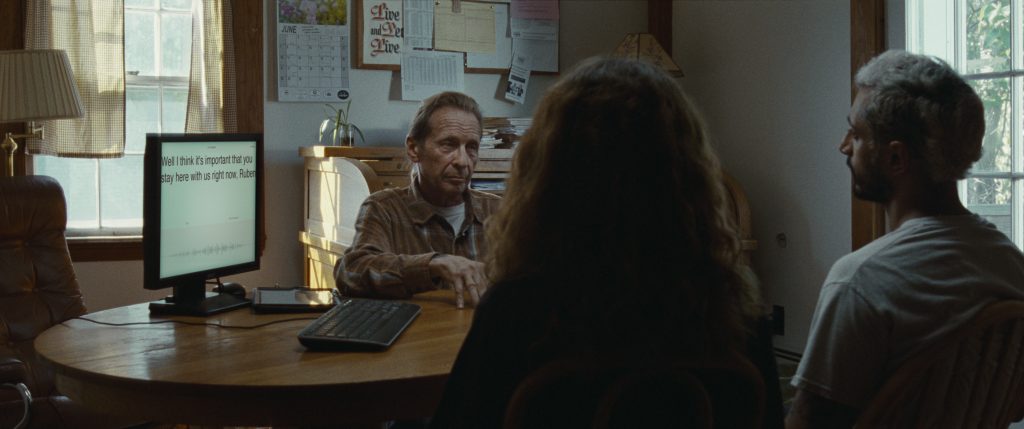April 25, 2021
by Carla Hay

With three prizes, including Best Picture, “Nomadland” was the top winner for the 93rd Annual Academy Awards, which took place place at Union Station and at the Dolby Theatre in Los Angeles on April 25, 2021. There was no host for the ceremony, which was telecast in the U.S. on ABC. Searchlight Pictures’ “Nomadland” also won the awards for Best Director (for Chloé Zhao) and Best Actress (for Frances McDormand). In the movie, McDormand portrays a widow who lives out of her van and travels across different states in U.S. to find work.
With 10 nods, the Netflix drama “Mank” was the top nominee and ended up with two Academy Awards. Movies that won two Oscars each included:
- “Judas and the Black Messiah” (Warner Bros. Pictures): Best Supporting Actor (for Daniel Kaluuya), Best Original Song (“Fight for You”)
- “Mank” (Netflix): Best Production Design, Best Cinematography
- “Ma Rainey’s Black Bottom” (Netflix): Best Makeup and Hairstyling, Best Costume Design
- “Sound of Metal” (Amazon Studios): Best Film Editing, Best Sound
- “Soul” (Pixar Studios): Best Animated Feature, Best Original Score
The awards are voted for by the Academy of Motion Picture Arts and Sciences. For the 2021 ceremony, eligible movies were those released in the U.S. in 2020 and (due to the coronavirus pandemic) the eligibility period was extended to movies released in January and February 2021. Because of the pandemic, movies that were planned for a theatrical release but were released directly to home video or on streaming services were also eligible. Beginning with the 2022 Academy Awards ceremony, there will be a required 10 movies nominated for Best Picture. From 2009 to 2021, the rule was that there could be five to 10 movies per year nominated for Best Picture.
Because of the COVID-19 pandemic, there were less people invited to the Oscar ceremony in 2021. The presenters included Riz Ahmed, Angela Bassett, Halle Berry, Don Cheadle, Bryan Cranston, Viola Davis, Laura Dern, Harrison Ford, Bong Joon Ho, Regina King, Marlee Matlin, Rita Moreno, Joaquin Phoenix, Brad Pitt, Reese Witherspoon, Steven Yeun, Renée Zellweger and Zendaya.
The 2021 Oscar ceremony also marked big changes to the show in other ways. Performances of the year’s Oscar-nominated songs usually take place during the ceremony. Instead, the performances of the five nominated songs were pre-recorded and televised during the 90-minute pre-show telecast “Oscars: Into the Spotlight,” which included live interviews from the Oscar red carpet. This pre-show telecast was hosted by actors Ariana DeBose and Lil Rel Howery.
Howery acted as an unofficial emcee during parts of the Oscar telecast, which included a segment where Howery played a trivia game where people in the audience had to guess if a song was an Oscar winner, an Oscar nominee or wasn’t nominated for an Oscar at all. The segment started out flat and awkward. Andra Day got her answer correct that Prince’s “Purple Rain” song wasn’t even nominated. (However, the “Purple Rain” soundtrack score did an Oscar.)Kaluuya incorrectly guessed that Donna Summer’s “Last Dance” didn’t win an Oscar. (It did.)
But the segment end up being saved by Glenn Close, who correctly guessed that E.U.’s “Da Butt” (from Spike Lee’s 1988 movie “School Daze”) wasn’t nominated for an Oscar, and she proceeded to show her knowledge of ’80s hip-hop by getting up and doing “Da Butt” dance. This moment got a lot of laughs and cheers and will be sure to be remembered as the most unexpected comedic moment at the 2021 Academy Awards. This moment with Close could have been pre-planned and rehearsed since she seemed a little too prepared with an answer, but it didn’t take away from it being one of the show’s highlights that didn’t involve an acceptance speech.
Steven Soderbergh, Stacey Sher and Jesse Collins were the producers of the Academy Awards show. They also made some changes to the show’s format. Instead of presenting the prizes for Best Picture last, the awards for Best Actor and Best Actress were presented last. The award for Best Picture was the third-to-last award presented. The prize for Best Director was handed out in the middle of the ceremony, instead of following the tradition of being the second-to-last award handed out during the ceremony.
Another big change was that winners were not limited to a 90-second acceptance speech. Some acceptance speeches lasted longer than three minutes. In addition, there was no live orchestra at the ceremony. Instead, musician Questlove was a DJ at the award show. Because of the COVID-19 pandemic, many of the nominees were shown via satellite in various parts of the world, such as London, Paris and Sydney.
The Oscar ceremony made history in some diversity issues, as Zhao (a Chinese-born filmmaker) became the first woman of color to win Best Director. She is also the second woman in Oscar history to win this Best Director prize. (Kathryn Bigelow, director of the 2009 war film “The Hurt Locker,” was the first woman to win the Best Director award in 2010.) Zhao’s victory had been widely predicted, since Zhao won all of the year’s major Best Director awards for “Nomadland” prior to winning the Oscar.
Mia Neal and Jamika Wilson of “Ma Rainey’s Black Bottom” made Oscar history by being the first black people to be nominated for and to win the prize for Best Makeup and Hairstyling. This breakthrough was acknowledged during their acceptance speech for the award, which they share with Sergio Lopez-Rivera. Neal said in her acceptance speech: “I want to say thank you to our ancestors who put the work in, who were denied, but never gave up. I also stand here—as Jamika and I break this glass ceiling—with so much excitement for the future.”
Meanwhile, South Korean actress Yuh-jung Youn of “Minari” became the first Asian-born woman to win in the Best Supporting Actress category. In 1958, Japanese American actress Miyoshi Umeki of the 1957 movie “Sayonara” became the first Asian woman overall to win in the Best Supporting Actress category.
Although the late Chadwick Boseman was widely predicted to win the Best Actor award for “Ma Rainey’s Black Bottom,” which was his last film role, the prize went to Anthony Hopkins for “The Father.” (Hopkins did not attend the Oscar ceremony and was not available by video.) At 83 years old, Hopkins became the oldest person to win an Oscar in an actor/actress category, surpassing the record set by “Beginners” co-star Christopher Plummer, who won the Best Supporting Actor award in 2012, at the age of 82.
Boseman won several Best Actor prizes (including a Golden Globe Award and a Screen Actors Guild Award) for “Ma Rainey’s Black Bottom” leading up to Oscar ceremony. However, there was a foreshadowing that Boseman might not win the Oscar when he was nominated for but didn’t win the prizes for Best Actor at the BAFTA Awards and Film Independent Spirit Awards, which were the two major award shows that took place closest to the Oscars. Boseman died of colon cancer in August 2020.
The Motion Picture & Television Fund (MPTF) received the Jean Hersholt Humanitarian Award, with MPTF officials Bob Beitcher, Norma Carranza and Jennifer Jorge acceping the prize on stage. Tyler Perry received the Jean Hersholt Humanitarian Award, a non-competitive prize. In his speech, he urged people to “stand up to hate” and to be more giving and compassionate with each other.
Here is the complete list of winners and nominations for the 2021 Academy Awards:
*=winner
Best Picture
“The Father” (Sony Pictures Classics)
“Judas and the Black Messiah” (Warner Bros.)
“Mank” (Netflix)
“Minari” (A24)
“Nomadland” (Searchlight Pictures)*
“Promising Young Woman” (Focus Features)
“Sound of Metal” (Amazon Studios)
“The Trial of the Chicago 7” (Netflix)
Best Director
Thomas Vinterberg (“Another Round”)
David Fincher (“Mank”)
Lee Isaac Chung (“Minari”)
Chloé Zhao (“Nomadland”)*
Emerald Fennell (“Promising Young Woman”)
Best Actor in a Leading Role
Riz Ahmed (“Sound of Metal”)
Chadwick Boseman (“Ma Rainey’s Black Bottom”)
Anthony Hopkins (“The Father”)*
Gary Oldman (“Mank”)
Steven Yeun (“Minari”)
Best Actress in a Leading Role
Viola Davis (“Ma Rainey’s Black Bottom”)
Andra Day (“The United States v. Billie Holiday”)
Vanessa Kirby (“Pieces of a Woman”)
Frances McDormand (“Nomadland”)*
Carey Mulligan (“Promising Young Woman”)
Best Actor in a Supporting Role
Sacha Baron Cohen (“The Trial of the Chicago 7”)
Daniel Kaluuya (“Judas and the Black Messiah”)*
Leslie Odom Jr. (“One Night in Miami”)
Paul Raci (“Sound of Metal”)
LaKeith Stanfield (“Judas and the Black Messiah”)
Best Actress in a Supporting Role
Maria Bakalova (“Borat Subsequent Moviefilm”)
Glenn Close (“Hillbilly Elegy”)
Olivia Colman (“The Father”)
Amanda Seyfried (“Mank”)
Yuh-jung Youn (“Minari”)*
Best Adapted Screenplay
“Borat Subsequent Moviefilm.” Screenplay by Sacha Baron Cohen, Anthony Hines, Dan Swimer, Peter Baynham, Erica Rivinoja, Dan Mazer, Jena Friedman and Lee Kern; Story by Sacha Baron Cohen, Anthony Hines, Dan Swimer and Nina Pedrad
“The Father,” Christopher Hampton and Florian Zeller*
“Nomadland,” Chloé Zhao
“One Night in Miami,” Kemp Powers
“The White Tiger,” Ramin Bahrani
Best Original Screenplay
“Judas and the Black Messiah.” Screenplay by Will Berson, Shaka King; Story by Will Berson, Shaka King, Kenny Lucas and Keith Lucas
“Minari,” Lee Isaac Chung
“Promising Young Woman,” Emerald Fennell*
“Sound of Metal.” Screenplay by Darius Marder and Abraham Marder; Story by Darius Marder, Derek Cianfrance
“The Trial of the Chicago 7,” Aaron Sorkin
Best Cinematography
“Judas and the Black Messiah,” Sean Bobbitt
“Mank,” Erik Messerschmidt*
“News of the World,” Dariusz Wolski
“Nomadland,” Joshua James Richards
“The Trial of the Chicago 7,” Phedon Papamichael
Best Film Editing
“The Father,” Yorgos Lamprinos
“Nomadland,” Chloé Zhao
“Promising Young Woman,” Frédéric Thoraval
“Sound of Metal,” Mikkel E.G. Nielsen*
“The Trial of the Chicago 7,” Alan Baumgarten
Best Sound
“Greyhound,” Warren Shaw, Michael Minkler, Beau Borders and David Wyman
“Mank,” Ren Klyce, Jeremy Molod, David Parker, Nathan Nance and Drew Kunin
“News of the World,” Oliver Tarney, Mike Prestwood Smith, William Miller and John Pritchett
“Soul,” Ren Klyce, Coya Elliott and David Parker
“Sound of Metal,” Nicolas Becker, Jaime Baksht, Michelle Couttolenc, Carlos Cortés and Phillip Bladh*
Best Original Score
“Da 5 Bloods,” Terence Blanchard
“Mank,” Trent Reznor, Atticus Ross
“Minari,” Emile Mosseri
“News of the World,” James Newton Howard
“Soul,” Trent Reznor, Atticus Ross, Jon Batiste*
Best Original Song
“Fight for You,” (“Judas and the Black Messiah”). Music by H.E.R. and Dernst Emile II; Lyric by H.E.R. and Tiara Thomas*
“Hear My Voice,” (“The Trial of the Chicago 7”). Music by Daniel Pemberton; Lyric by Daniel Pemberton and Celeste Waite
“Húsavík,” (“Eurovision Song Contest”). Music and Lyric by Savan Kotecha, Fat Max Gsus and Rickard Göransson
“Io Si (Seen),” (“The Life Ahead”). Music by Diane Warren; Lyric by Diane Warren and Laura Pausini
“Speak Now,” (“One Night in Miami”). Music and Lyric by Leslie Odom, Jr. and Sam Ashworth
Best Animated Feature Film
“Onward” (Pixar)
“Over the Moon” (Netflix)
“A Shaun the Sheep Movie: Farmageddon” (Netflix)
“Soul” (Pixar)*
“Wolfwalkers” (Apple TV+/GKIDS)
Best International Feature Film
“Another Round” (Denmark)*
“Better Days” (Hong Kong)
“Collective” (Romania)
“The Man Who Sold His Skin” (Tunisia)
“Quo Vadis, Aida?”(Bosnia and Herzegovina)
Best Documentary Feature
“Collective” (Magnolia Pictures and Participant)
“Crip Camp” (Netflix)
“The Mole Agent” (Gravitas Ventures)
“My Octopus Teacher” (Netflix)*
“Time” (Amazon Studios)
Best Makeup and Hairstyling
“Emma,” Marese Langan, Laura Allen, Claudia Stolze
“Hillbilly Elegy,” Eryn Krueger Mekash, Patricia Dehaney, Matthew Mungle
“Ma Rainey’s Black Bottom,” Sergio Lopez-Rivera, Mia Neal, Jamika Wilson*
“Mank,” Kimberley Spiteri, Gigi Williams, Colleen LaBaff
“Pinocchio,” Mark Coulier, Dalia Colli, Francesco Pegoretti
Best Costume Design
“Emma,” Alexandra Byrne
“Mank,” Trish Summerville
“Ma Rainey’s Black Bottom,” Ann Roth*
“Mulan,” Bina Daigeler
“Pinocchio,” Massimo Cantini Parrini
Best Production Design
“The Father.” Production Design: Peter Francis; Set Decoration: Cathy Featherstone
“Ma Rainey’s Black Bottom.” Production Design: Mark Ricker; Set Decoration: Karen O’Hara and Diana Stoughton
“Mank.” Production Design: Donald Graham Burt; Set Decoration: Jan Pascale*
“News of the World.” Production Design: David Crank; Set Decoration: Elizabeth Keenan
“Tenet.” Production Design: Nathan Crowley; Set Decoration: Kathy Lucas
Best Visual Effects
“Love and Monsters,” Matt Sloan, Genevieve Camilleri, Matt Everitt and Brian Cox
“The Midnight Sky,” Matthew Kasmir, Christopher Lawrence, Max Solomon and David Watkins
“Mulan,” Sean Faden, Anders Langlands, Seth Maury and Steve Ingram
“The One and Only Ivan,” Nick Davis, Greg Fisher, Ben Jones and Santiago Colomo Martinez
“Tenet,” Andrew Jackson, David Lee, Andrew Lockley and Scott Fisher*
Best Documentary Short Subject
“Colette” (Time Travel Unlimited)*
“A Concerto Is a Conversation” (Breakwater Studios)
“Do Not Split” (Field of Vision)
“Hunger Ward” (MTV Documentary Films)
“A Love Song for Latasha” (Netflix)
Best Animated Short Film
“Burrow” (Disney Plus/Pixar)
“Genius Loci” (Kazak Productions)
“If Anything Happens I Love You” (Netflix)*
“Opera” (Beasts and Natives Alike)
“Yes-People” (CAOZ hf. Hólamói)
Best Live-Action Short Film
“Feeling Through”
“The Letter Room”
“The Present”
“Two Distant Strangers”*
“White Eye”






